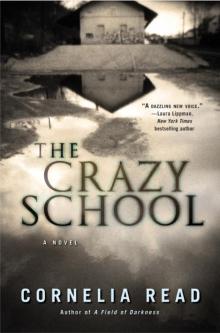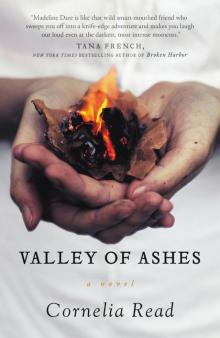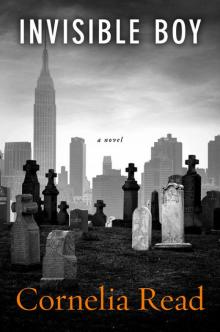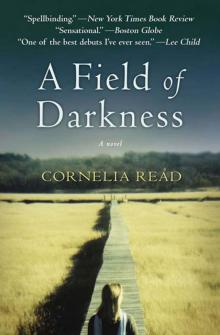- Home
- Cornelia Read
Invisible Boy Page 4
Invisible Boy Read online
Page 4
Cate came back and sat down with us. At first the kids grew quiet, but soon the babble started up again, even more overwhelming.
I tried closing my eyes for a minute after swabbing my face with my clammy bandanna.
I couldn’t keep them shut, though. I was too intent on checking the gate for plainclothes arrivals.
Then I looked up at the young cop’s face. His short hair was dark with sweat, and I worried he’d have a stroke and keel over onto the scrubby brown grass or pitch headfirst against the blunt edge of a gravestone.
I leaned over toward Cate. “He’s not looking too good,” I said.
Cate stood up to place a gentle hand on his arm.
“Would you like to move us into the chapel?” she asked. “It’s a great deal cooler inside, and we can all drink some cold water.”
The cop gratefully agreed, and the two of them began herding the kids indoors.
I was about to follow them in when I saw a dark sedan pull up alongside the cemetery gate, a chrome-free Crown Vic with a fat antenna sprouting off the lid of its trunk.
We all savored the chapel’s cool interior with the young cop as our shepherd, drinking ice water and grateful to be sheltered from the sun.
The kids’ restlessness tapered off once we got inside. Maybe it was the dimmer light indoors that made us all settle down, or maybe it was just that we’d all worked ourselves hard on the brush clearing and were now settling into a midafternoon blood-sugar crash exacerbated by post-adrenaline-rush torpor.
The girls all grabbed their school backpacks from the room’s back wall and started in on homework assignments. Three of the boys made binder-paper airplanes and lofted them down the nave, competing to see whose craft could drift the farthest before succumbing to gravity.
The sun shifted lower in the sky, sending a thick shaft of light slanting down from the arched western doorway, highlighting the toy planes’ wake through whirling motes of dust.
The sounds outside seemed more distant: rush of trains muted by the chapel’s pale gold stone walls, mutter and hiss of the cops’ radios unintelligible.
High stained-glass windows faced north and south, their intricately fitted cobalt and scarlet and butter-yellow panes interspersed with empty spots that laid bare the place-holding traceries of lead.
“I don’t know what to do,” said Cate, finally. “I have two packs of Chips Ahoy in one of those bags, but I can’t imagine anyone wanting to eat them, considering.”
I took another sip of water and swallowed it. “Maybe the kids are hungry?”
Cate stood up. “I’ll put them on top of the cooler.”
Our young cop Fergus asked if he could grab a couple. Then the kids dove in.
After that there was nothing else for me and Cate to do but wait. We were quiet for ten minutes or so, and I could tell it was making her jittery; my shock passing, her own just settling in.
I figured I’d better keep her talking, keep her mind occupied.
“So who built this place?” I asked.
“Our great-great-great-something-or-other Nicholas commissioned it in 1857, in memory of his three daughters. He named it the Chapel of the Sisters.”
I looked across the room toward the weathered mahogany pulpit, its dusty façade graced with overlapping arches.
“When I think about what this could be,” said Cate, “instead of a place so ignored and abandoned that someone could literally discard a child?”
“Do people break in other than the homeless guys?”
“Some of the monuments have been tipped over and smashed. And the local junkies used the chapel for a shooting gallery before I got decent locks on the doors. I was terrified I’d walk in here and find someone who’d OD’d.”
“Has anyone ever messed with the graves themselves, though? Dug them up?”
Cate shook her head. “Maybe the parents couldn’t afford a proper funeral?”
“Sure,” I said. But I didn’t believe it, not for a second.
“A family would have tried to bury their child,” she said, looking down at her lap.
I traced a finger beneath an inscription carved into the wall beside us: I will ransom them from the grave….
“The ground hadn’t been disturbed,” I said. “There was a thick bed of leaves underneath the bones, and the rib cage was smashed in—”
“Please,” said Cate, her eyes clenching shut as she snapped her hand up between us, palm toward me. “I don’t think I can handle details.”
“I’m sorry,” I said. “I’ll save it for the detectives.”
She touched my kneecap. “ I’m sorry.”
“I know, Cate.”
And I did know, too well. I’d seen some awful things the last few years. Been through some shit.
It hadn’t made me any tougher or braver. It’d only made me tired and sad.
And inconsiderate sometimes, like now.
Cate was trembling. I put my arm around her shoulders.
“Hey, you know what’s good about all this?” I asked.
“God, please tell me,” she said, “because I can’t think of a single thing.”
“The cops are taking it really seriously, you know? Roping off the scene, keeping us all here… these guys aren’t messing around.”
“That is good.”
“Wanna cookie?” I asked.
Cate shook her head. “Man, who’d’ve thought the cemetery lady would turn out to be such a wuss, eh?”
“You’re not a wuss. You’re just sane.”
Our young cop’s shoulder radio crackled to life, and I heard a gravelly voice say, “Skwarecki’s here. Now we’re waiting on the ME.”
I wondered what Skwarecki would look like. Some beefy guy with a mustache, probably. Grizzled former jock, lots of broken capillaries.
That was the visual average of homicide detectives I’d dealt with before this.
Fergus stiffened up, shoulders thrown back, and I turned to look toward whomever he was staring at.
I was struck by two facts in that instant: I was looking at Skwarecki, and I was an idiot.
She wore a gold badge at the waist of her knife-creased gray trousers, one finger hooked into the collar of a matching jacket slung over her shoulder. Her highlights could’ve used a little touch-up at the roots, but her loafers were buffed to a twinkle.
My imaginary composite had one detail correct, however. The woman had twenty years on me, but she was still a jock to the bone.
I pegged her for field hockey once upon a time. Good shoulders on her, if a bit slight for defense. Narrow hips and some meat on the back of her thighs: a sprinter.
“Yo, Opie,” she said, snapping her fingers at our young cop.
Her voice was fast, clipped Queens, that definitive outer-borough twang, like she had gravel in her sinuses.
“The fuck you waiting on,” she said, “second coming of Christ? Get your butt over here.”
He hustled to comply, and she was right in his face, cocking one hip as she tapped his badge with her finger.
“Albie,” she said, “that what they call you when you’re awake?”
He blushed and nodded but she’d made him smile, too.
Neat trick, to bitch someone out and win him over simultaneously.
“So, walk me through this, Albie,” she said. “We got a body outside, and we got a bunch of nice people sitting around inside, and you’re empty-handed—no clipboard, no pen. As a highly trained detective, this tells me you know exactly what took place here and I can go home already, because you stole the collar right out from under my ass before I even showed up—am I right?”
He shook his head, blushing deeper. But she’d made him laugh.
“So what can you tell me?” she asked. “You got any leads on who’s in charge here?”
He pointed at Cate.
“Excellent,” she said. “Now, who found the scene?”
He pointed at me.
“Keep this up,” she said, “they’re gonna m
ake you commissioner.”
He smiled, and Skwarecki told him to get the kids’ names and contact info, then send them home.
She gave him a friendly punch to the shoulder, turning toward me and Cate.
8
Skwarecki told us her first name was Jayné, pronounced Jen-NAY.
“My mother was some kind of French,” she said, and shrugged. “But no one ever calls me that.”
She’d brought Cate and me back outside.
The medical examiner’s van pulled up, and a grim-looking guy climbed out of it with a large black case. Giving Skwarecki a dour wave, he ducked under the crime-scene tape and disappeared into the bushes.
“You gotta be anywhere?” she asked. “I’d like to bring you both down to the precinct.”
Cate told her no and I said not really, but that I’d like to call home.
I felt in my pocket for change. “Okay if I run out and find a pay phone?”
Skwarecki was cool with that, so I started toward the cemetery’s gate.
Dean picked up when I dialed the apartment.
“Yo,” I said, “Intrepid Spouse.”
“What’s up? You sound kind of bummed.”
I sighed. “I might be late for dinner.”
“Do tell.”
“I’m at the cemetery. With a homicide detective.”
“Bunny, you okay?”
Here’s the great thing about Dean: he doesn’t get freaked out by much. This has proved to be a necessary attribute in a person who finds himself married to me.
“I found a skeleton,” I said.
“In a cemetery.”
“It’s a little kid,” I said. “And it doesn’t look like it was ever buried, so, you know, we called the cops and stuff.”
“You sure you’re okay?”
“Kind of.”
“You sound shaky,” he said.
“More sad,” I said. “The kid was really little.”
“You want me to come out there?”
“That’s okay, but I appreciate the offer.”
“We’re supposed to have dinner with Nutty Buddy.”
“Crap,” I said. “Astrid.”
“Want me to postpone it?”
I looked at my watch: just after five o’clock. “I think I could make it by eight. Can you call her?”
Dean said he would and I thanked him and placed the phone back on the hook.
I’d just stepped onto the sidewalk across from the cemetery when a second dark Crown-Vic-esque sedan pulled in behind the ME’s van.
As I crossed the street, the driver’s door opened, disgorging a hard-ass-but-elegant-looking African American chick in crimson lipstick and a chalk-striped navy power suit.
The woman wore her hair short, her neck graceful as an egret’s. She had feline cheekbones and a complexion the color of strong, clear tea—richly brown and gold and red, all at once.
She glanced around for a nanosecond, fists on her hips, then made the proverbial beeline through the gate for Skwarecki.
I watched the muscles of her long stocking-sheathed calves bunch up as she shifted her weight forward to keep her spike heels from sinking into the crabgrass.
Shoes that expensive, she had to be a lawyer.
I followed her through the gate.
Ten feet in she stopped walking, calves still clenched as she balanced on the balls of her feet.
I ducked past her, trying to act unobtrusive until I pulled up alongside Cate, who was looking down at the clipboard in Skwarecki’s hands and nodding while the detective jotted down notes.
The elegant attorney called out, “Yo, Jayné!”
Skwarecki lifted her head. “You get dragged into this mishegoss already, Bost?”
The chic stranger shrugged. “Yeah, right?”
“ME hasn’t weighed in a hundred percent yet,” said Skwarecki.
“You know the drill. Your guys call my guys. My guys call me. I go, ‘How high?’ ”
Skwarecki nodded. “Looking like we maybe got something.”
“Nice day for it.” The woman rested her knuckles back on her hips. “You planning to introduce me?”
“Like you need some engraved invitation?” asked Skwarecki.
The attorney started picking her way across the grass toward the three of us, hands held out a little for balance.
“Behold Louise Wilson Bost,” said Skwarecki, “assistant district attorney for the Borough of Queens—top prosecutor in our homicide division, but she dresses way too girly for the job.”
Bost-the-Best shot me and Cate a wink and a smile. “Pay no attention to Detective Skwarecki, ladies. She can’t hack the competition.”
“Hand to God,” said Skwarecki. “My next paycheck? I’m buying Louise here a pair of sneakers.”
Bost waved a hand in Skwarecki’s general direction. “Such a kidder, this one. Laugh? I thought I’d never stop.”
She teetered up to us, a little out of breath. “I came straight from court, and I want to look nice for my clients. They’ve got it hard enough.”
Sobering thought: dressing well for her clients was a show of respect for the dead.
Skwarecki said, “This is Cate Ludlam, in charge of the preservation efforts here.”
Bost reached to shake Cate’s hand.
“And Madeline Dare,” Skwarecki continued, “who discovered the child’s remains.”
“A pleasure, Ms. Bost,” I said when she shifted to grip my hand in turn.
“ Louise,” she replied. “Let’s not stand on formality. I’m sure this hasn’t been an easy day for the two of you, and if the ME does weigh in a hundred percent, we may be spending some time together.”
No sooner had she said that than the man himself climbed out of the bushes. He stood up and removed his thin gloves with a snap.
From the grim look on his face, a hundred percent was the least of it.
9
The ME took Skwarecki and Bost aside to talk. They stepped into a spot of shade just inside the chapel’s doorway.
We could see their faces again, now, and the conversation was obviously a grim one.
“Those are not happy people,” said Cate. “Not by a long shot.”
“I wonder what he’s telling them,” I said.
“I’m pretty sure I don’t want to know.”
The ME finally peeled off from the trio and climbed into his van.
Bost wasn’t worried about her shoes anymore when she and
Skwarecki started back toward us.
“Ladies,” she said, “we’d like to drive you down to the precinct house now, if that’s all right.”
“They don’t give you guys air-conditioning?” I asked Skwarecki, cranking my window down as she pulled out onto the boulevard.
Bost and Cate followed in separate cars.
Skwarecki snorted at that. “Half the time you’re lucky these crates have wheels.”
She drummed her fingertips along the top of the steering wheel, already impatient with driving slow enough for the entourage to keep pace.
“Big engine, though, huh?” I asked.
Skwarecki smiled. “Big enough.”
“Slap that cherry on the roof, I bet you could haul serious ass in this thing.”
“Got that right.”
She checked the rearview mirror, making sure we hadn’t lost Cate and Bost.
“Crap,” she said, impatient. “Make way for ducklings.”
We pulled into the One-Oh-Three and Skwarecki led us upstairs, into a warren of glossy, institutional-green hallways. We wandered down them single file behind her, twisting and turning past windowed door after windowed door.
Most of these bore a department title—FRAUD or SPECIAL VICTIMS or ROBBERY—with butcher paper taped to the back of each glass panel. You couldn’t see a goddamn thing beyond them.
Bost obviously knew her way around as well as Skwarecki did, but I was getting more disoriented by the second, sneakers squeaking against the highly polished linoleum.
We skidded to a halt in front of a door marked HOMICIDE.
Skwarecki ushered us over the threshold and into a bright, noisy bull pen crammed with desks.
I looked at my watch again: just after five.
“You have to be somewhere?” asked Skwarecki, pulling up a couple of chairs for me and Cate.
“I’m supposed to meet people around eight,” I said, “but I can blow it off. No biggie.”
“We should have you out of here by then,” she said.
Bost looked at her own thin watch but didn’t sit down. “I need to make a call. May I get anyone some water?”
Cate asked for the ladies’ room, and the two of them walked away.
“I take it the ME’s news wasn’t good?” I asked Skwarecki.
“It wasn’t, no.”
“Could he tell how old the kid was?”
“Around three.”
“ Three,” I said, “Jesus. And you guys think this was a homicide?”
“Skeletal remains, you can have trouble with cause of death, but the ME seems pretty certain in this case.”
“Yeah,” I said. “Just… looking at the rib cage.”
Skwarecki nodded. “We’ll know more when they finish the postmortem, but there were a number of badly healed fractures.”
My throat went all tight. I winced and shook my head, raising my hands up like I could keep the images of suffering at bay.
“You okay?” Skwarecki asked, voice quieter, tough-chick edge fallen away when she saw my eyes tearing up.
“Okay? Yeah,” I said. “But really, really pissed off.”
“Good for you.”
I wiped away the incipient tears. “I mean, what the fuck is wrong with people, you know?”
“I know,” she said.
“A little kid?”
“Preaching to the choir,” she said.
“Does it get to you?”
“Every damn time.”
“I can’t imagine what kind of balls this job must take.”
“They’re not all this bad,” she said. “Most times, it’s bad guys killing bad guys, you know? But a kid…”
“Does it get easier?”
She shook her head. “No. Never.”
“Does it help if you nail who did it?”

 The Crazy School
The Crazy School Valley of Ashes
Valley of Ashes Invisible Boy
Invisible Boy A Field of Darkness
A Field of Darkness